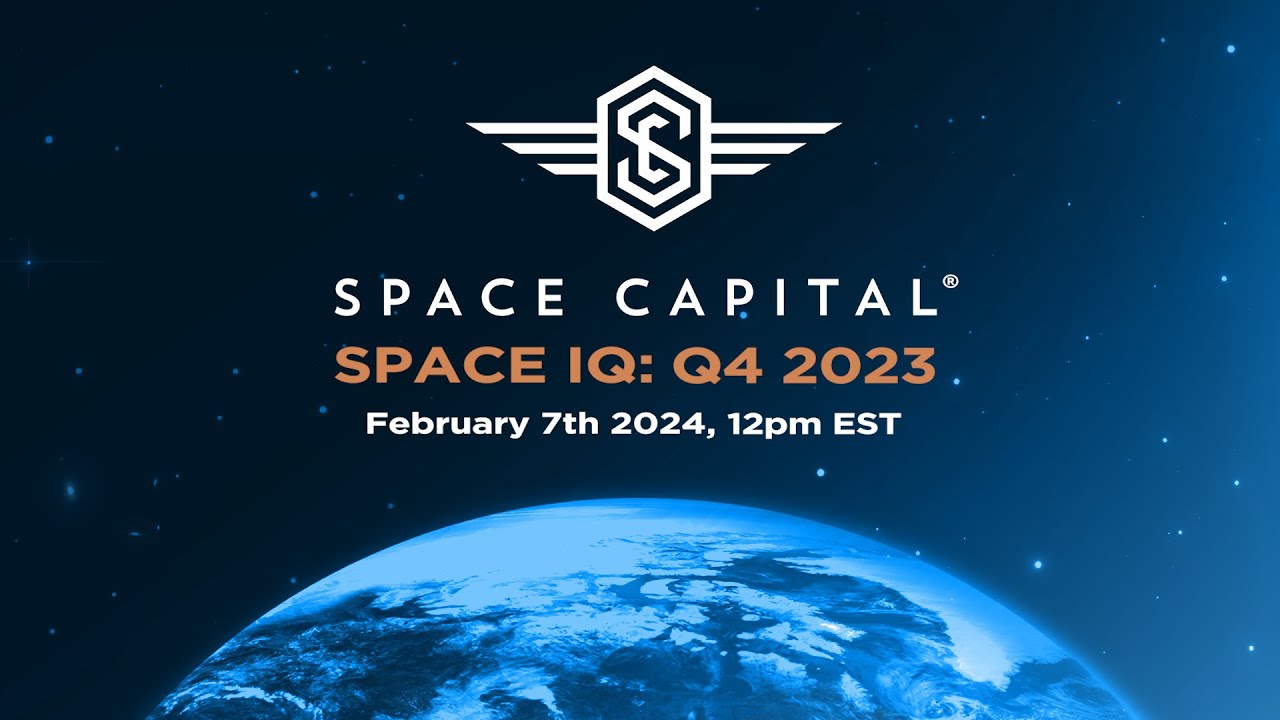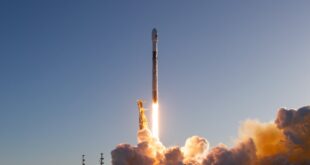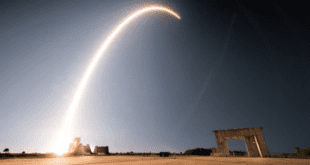By Christophe Bosquillon

On 07 February 2024, we attended a review of the space economy hosted by Space Capital’s Chad Anderson and Justus Kilian. This follows the publication of their Q4 2023 report back in January 2024, which readers can download here.
SpaceWatch.Global covered previous interventions by Chad Anderson at space conferences here and here. This time around, Space Capital provided their own short 25 minutes in-house review of investment trends in the space economy, current market dynamics, and the most relevant themes of Q4 2023, looking forward to 2024 and beyond.
Facts and numbers
The space economy is resilient, despite challenging investment conditions. Space Capital highlighted the difference between the space capital markets and broader tech markets, with the space economy experiencing significant activity despite a rough year for Mergers and Acquisitions (M&A) and Initial Public Offerings (IPOs).
It has now become paramount to emphasizes the need to make space infrastructure more accessible to various new-to-space industries.
A liquidity crunch in the tech industry didn’t prevent $4.5 billion from being invested in Q4 2023, totalling $289 billion over the last 10 years, across 1,800 space companies, with positive returns seen from the top 10 transactions.
Winners and losers
SpaceX achieved a stellar year, executing more record-setting launches than ever before, with 96 successful launches including five Falcon Heavies. SpaceX also set a record for reusing boosters 19 times, and are now working on certifying their boosters for even more reuses, setting a new standard in the industry. Musk’s company also set a new record for the shortest turnaround time between launches, and both Starship flight tests were considered successful, contributing significantly to technical progress.
The Starlink side of the business saw the launch of 1,776 new satellites, significantly increasing the total in orbit. Additionally, six new direct-to-cellular satellites were launched, opening up a new market. The company experienced strong revenue growth in 2022, with $4.6 billion in revenue, Q1 cash flow positivity, and the potential for doubling those figures in 2023.
Despite SpaceX’s achievements, a drop in investments in space applications and location-based services led to significantly fewer deals on record for the space economy in 2023. As for a 2024 market competition outlook, Bezos’ Blue Origin is poised to challenge SpaceX, while Amazon’s Kuiper satellites may compete for Starlink’s share.
The holy alliance of capitalism and government
The government’s shift towards commercial partnerships is driving significant investment. 2023 witnessed a surge of M&A activity in the space industry, with companies acquiring strategic technologies and teams to consolidate their businesses. The US government partnerships played a significant role in driving investment and stimulating M&A activities, with a focus on infrastructure firms: this is exemplified by Rocket Lab’s acquisition of satellite companies, and Planet’s efforts in driving applications on their dataset.
Defence to the rescue
The US Department of Defense’s shifting focus towards commercial partnerships in space technology is having a significant impact by leading the charge in government procurement. With an annual budget of a trillion dollars, any changes in government procurement practices will have a significant effect on space start-ups and investments. This trend, which began in 2023, has continued into 2024 and beyond as large government agencies learn to work with commercial companies.
According to Space Capital, this shift is driven by the Department of Defense and the whole of the US government’s rearchitecting of their space assets from concentrated, expensive systems to distributed, software-based, and more expendable systems. This transition is part of a new potential space race and a new form of global arms race, with total space spending increasing significantly over the last few years.
Forward trends
For Space Capital, trends expected in 2024 and beyond, include record-breaking launches, AI deployment in enterprise workflow, and rapidly increasing importance of space traffic management.
The space economy is resilient, despite challenging investment conditions.
Market specifics to watch in 2024 include Blue Origin’s self-capitalization and expansion into launch capabilities and broad applications, Armada’s role as a customer service and delivery arm for Starlink, and Shield AI’s focus on GPS-denied hostile environment communication and autonomous capabilities in the defence sector.
As investment in the space economy further increases, understanding and mastering the path to exit becomes increasingly critical for private market investors. Space Capital has accordingly introduced a new section in their report, focusing on the path to exit, which connects private market investment and start-up activity data to the public markets and provides insights into M&A, IPOs, valuation multiples, and acquiring companies in the space economy.
Lessons learned
As the government adopts technology and relies more on commercial partners, the investment dollars are pursuing those companies that are likely to dominate this new landscape. There is an inevitable tension between the government’s approach of casting a wide net to access new capabilities, and venture capitalists’ consolidation of investments around a few promising companies. This creates both an opportunity and risks for the US, on which Space Capital will further provide specific analysis.
Infrastructure investments have now reached a record high, accounting for 70% of all investments. That is driven by government funding for defence tech, AI, and essential space-based technologies for national security and economic stability. It has now become paramount to emphasizes the need to make space infrastructure more accessible to various new-to-space industries.
While the deployment of AI plays a crucial role in reducing adoption barriers, space traffic management is increasingly becoming a major demand driver. Ultimately, such compelling partnerships as SpaceX/Starlink with T-Mobile for phones, and with John Deere for rural farming underscore the importance of satellite connectivity.
According to Aaron Wetzel, Vice President of Production and Precision Ag Production Systems at John Deere, “Throughout the year, farmers must complete tasks within extremely short windows of time. This requires executing incredibly precise production steps while coordinating between machines and managing machine performance. Each of these areas is enhanced through connectivity, making the entire operation more efficient, effective, and profitable.” Perhaps there is no better down-to-Earth example than John Deere of why it matters to keep investing in the nascent space economy.

Christophe Bosquillon has a diverse professional background, having operated globally with a focus on the Indo-Pacific region. His experiences in Japan, the Koreas, Taiwan, China, ASEAN, India, Russia, and Australia have given him a deep understanding of the multipolar realpolitik of our world under the Pax Americana. With a background in engineering, trade, and foreign direct investment in industries relevant to Space Resource Utilization (SRU), such as mining, transportation, energy, manufacturing, agrifood, environment, and digitalization, Chris is committed to developing SRU value chains that benefit the Earth. As an executive, owner, writer, and founder of Autonomous Space Futures Ltd, Chris has extensive experience in collaborative policy crafting and works to develop space business and governance models relevant to society. He is a member of NGOs that provide input to the United Nations Committee on the Peaceful Uses of Outer Space (UNCOPUOS) legal subcommittee Working Group on Space Resources. Chris contributes to regulatory clarity on appropriation, priority, sustainability, and sharing in a way that balances national interests with civil society inclusion, provided a transparent due process is followed. When advocating for access to technology and space for the Global South, Chris believes that emerging space powers’ participation in space markets must be commensurate with their interest and involvement in international space politics. He believes that their ability to develop sovereign domestic capabilities with spillover potential is also essential. Chris is keen on ‘Peace Through Strength’ diplomacy and deterrence-based security as enablers of secure space access. He supports sovereign cislunar space situational awareness as mandatory for freedom of circulation in the space domain and deconflicted cooperation on the Moon.
 SpaceWatch.Global An independent perspective on space
SpaceWatch.Global An independent perspective on space




